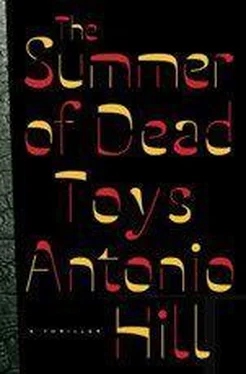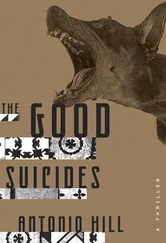Antonio Hill - The Summer of Dead Toys
Здесь есть возможность читать онлайн «Antonio Hill - The Summer of Dead Toys» весь текст электронной книги совершенно бесплатно (целиком полную версию без сокращений). В некоторых случаях можно слушать аудио, скачать через торрент в формате fb2 и присутствует краткое содержание. Жанр: Триллер, на английском языке. Описание произведения, (предисловие) а так же отзывы посетителей доступны на портале библиотеки ЛибКат.
- Название:The Summer of Dead Toys
- Автор:
- Жанр:
- Год:неизвестен
- ISBN:нет данных
- Рейтинг книги:4 / 5. Голосов: 1
-
Избранное:Добавить в избранное
- Отзывы:
-
Ваша оценка:
- 80
- 1
- 2
- 3
- 4
- 5
The Summer of Dead Toys: краткое содержание, описание и аннотация
Предлагаем к чтению аннотацию, описание, краткое содержание или предисловие (зависит от того, что написал сам автор книги «The Summer of Dead Toys»). Если вы не нашли необходимую информацию о книге — напишите в комментариях, мы постараемся отыскать её.
The Summer of Dead Toys — читать онлайн бесплатно полную книгу (весь текст) целиком
Ниже представлен текст книги, разбитый по страницам. Система сохранения места последней прочитанной страницы, позволяет с удобством читать онлайн бесплатно книгу «The Summer of Dead Toys», без необходимости каждый раз заново искать на чём Вы остановились. Поставьте закладку, и сможете в любой момент перейти на страницу, на которой закончили чтение.
Интервал:
Закладка:
“Shit. I fucked up.”
“Only a tiny bit. Nothing serious.” She paused briefly, then started the car without taking her eyes off her new companion. “Calm down, kid. And put on your seatbelt. We’re going to go for a spin and chat for a while.”
He obeyed with a bad grace and hissed something between his teeth.
“Something you want to say?”
“I said chatting takes two. .”
She laughed briefly.
“Well then, I talk and you listen. And if at the end you think it suits you to tell me anything, you do.”
“And if not?”
She put the car in reverse and moved off.
“If not, I’ll start up the monologue again to see if I can convince you. We girls are very tiresome, you know that. We like to hear ourselves talk.”
Rubén nodded and looked away indifferently toward the window. She’d already joined the sliproad, relatively empty of cars this July Saturday.
“I want to talk to you about a friend of yours, pretty posh of course. You know who I’m referring to, don’t you?”
Since there was no reaction from her companion, Leire continued her monologue without pausing, certain that he was listening to her attentively even though he pretended otherwise. When she mentioned the word “killer” he was tempted to turn toward her but resisted the impulse. However, as soon as she brought up Aleix’s family’s money, their contacts and the good lawyers they could hire to get their prodigal son out of this predicament-money, contacts and lawyers that he, a poor local fall guy, could only imagine-his survival instinct outweighed any other and Rubén told her what he knew and thought he’d seen on the eve of San Juan.
After making him promise to turn up at the station on Monday at the time she said, Leire let him go. She was sure the boy would keep his end of the deal. Then, for the third time that day, she grabbed her mobile and called Inspector Salgado.
34
When the old clock in her grandmother’s flat struck nine with the spirit of a chamber quartet, Joana realized she had been in front of the computer for hours, immersed in Marc’s texts and photos. She’d read them again and again, she’d looked at the photos, she’d seen him alive, drunk, smiling, playing the fool, serious, or simply caught by surprise with an absurd expression. He was a stranger to her, and yet in some spontaneous gestures she clearly saw young Enric, he who cared about nothing and lived to party, he who rejected his family’s ideals of effort and work. He who had won her over. And she understood with a mixture of relief and disappointment that the boy in the photos had maybe missed a mother figure when he was a child, but never her. Not Joana, with her faults, obsessions and virtues. In these photos, this boy was happy. Unconsciously happy. Happy as you can only be at nineteen, away from home and with the future stretching before your eyes as an unending succession of exciting moments. Maybe she was partly to blame for all that had happened to him, even the cursed chain of events that ended up throwing him out the window, but no more than Enric, no more than Fèlix, no more than these friends she didn’t know, no more than this Iris. Everyone had played their part, more or less honorable, more or less dignified. Thinking that she, a stranger after all, could claim a prominent role in Marc’s death was a sign of arrogance.
Night was falling, and she had to light the small table lamp, which blinked a couple of times, then went out completely. With a gesture of annoyance she rose to turn on the overhead light. It was a weak light which created a yellow, sad glow. Suddenly, she saw herself standing in that solitary, inherited flat, immersing herself in a past that she had left behind years before. She’d given up a lot then, but she’d managed to create a new life for herself since. Maybe not the one of her dreams, just one in which she could move without feeling trapped. And now, for the past few weeks, she’d fallen once again into a type of ridiculous self-imposed prison, that of a gray and defeated woman. Slowly, but without hesitation, she began to pack her bags. She didn’t plan on leaving until she’d seen this Iris and listened to what she had to tell her; then she would do what she had to do. Return to Paris, pick up her here and now, perhaps more imperfect than before, but at least hers. She’d earned it. As she folded her clothes, she wondered if Enric would be reading that same blog. She’d called him in the morning to tell him about it, but he hadn’t picked up the phone. She had left the message on his voicemail.
Enric started on hearing the creak of the study door. “Did I frighten you?”
“No.” At that moment he didn’t feel like speaking to Glòria
at all, but he forced himself to ask: “Is Natàlia in bed?”
“Yes.” She came over to the table. “She was waiting for you for a while, but in the end she fell asleep.”
Enric noticed the hint of reproach, so typical of his wife, who never complained directly. He usually pretended he hadn’t picked up on it, but that night, after two hours in front of the screen looking at photos of his dead son, the words came out of his mouth without him doing anything to stop them.
“I’m sorry. I’m not in the mood for stories tonight. Can you understand that?”
Glòria looked away. She didn’t answer. It was typical of her: never argue, look at him with that sort of condescending calm.
“You understand, don’t you?” he insisted.
“I only came to ask you if you wanted dinner.”
“Dinner?” The question seemed so trivial, so absurdly domestic, that he almost started laughing. “No. Don’t worry. I’m not hungry.”
“In that case I’ll leave you alone. Good night.”
Glòria went to the door without making a sound. Sometimes Enric thought he was married to a ghost, someone who could move without touching the ground. In fact, he thought his wife had already left when her serene voice, always in a tone lower than average, reached him.
“Unfortunately Marc is dead, Enric. You can’t do anything for him. But Natàlia is alive. And she needs you.”
She didn’t wait for him to respond. She closed the door softly and left him deep in his helplessness, in a sea of worrying questions brought up by this blog of which he hadn’t been aware until this evening. But the brief and thought-out appearance of Glòria had the virtue of adding another cross for him to bear. Another thing that was his fault. Because if there was anyone in this world who knew him, anyone who could read his mind with absolute clarity, that person was Glòria. And just as if he said it in words, his wife knew that he couldn’t feel anything more than affection for the little girl she adored. However much he tried to hide it, however much she tried not to notice, however much Natàlia called him “Daddy” and put her arms around his neck. He’d had only one child, and that child had died, almost certainly at the hands of the girl who’d been his best friend.
Seconds later, with a clenched fist and tense jaw, he picked up the telephone and called his brother. No one answered.
Fèlix contemplated the telephone. It rang urgently, as insistent and inconsiderate as the person calling him. That night he, who’d always mustered patience before Enric’s selfishness, hadn’t the least intention of picking up. He knew what he wanted to ask him. Who was this Iris? What was the point of this macabre tale? Enric didn’t remember anything, of course. Another father would, but not Enric. At most, he might vaguely remember that the camps finished early that summer due to an accident. Although, to tell the truth, he hadn’t given him many details either. However, he had observed his nephew closely. But Marc hadn’t suffered nightmares; in fact, as soon as he returned home, to his regular routine, he’d seemed to forget about Iris. Yes. Everyone had pretended to forget about Iris. It was best.
Читать дальшеИнтервал:
Закладка:
Похожие книги на «The Summer of Dead Toys»
Представляем Вашему вниманию похожие книги на «The Summer of Dead Toys» списком для выбора. Мы отобрали схожую по названию и смыслу литературу в надежде предоставить читателям больше вариантов отыскать новые, интересные, ещё непрочитанные произведения.
Обсуждение, отзывы о книге «The Summer of Dead Toys» и просто собственные мнения читателей. Оставьте ваши комментарии, напишите, что Вы думаете о произведении, его смысле или главных героях. Укажите что конкретно понравилось, а что нет, и почему Вы так считаете.












